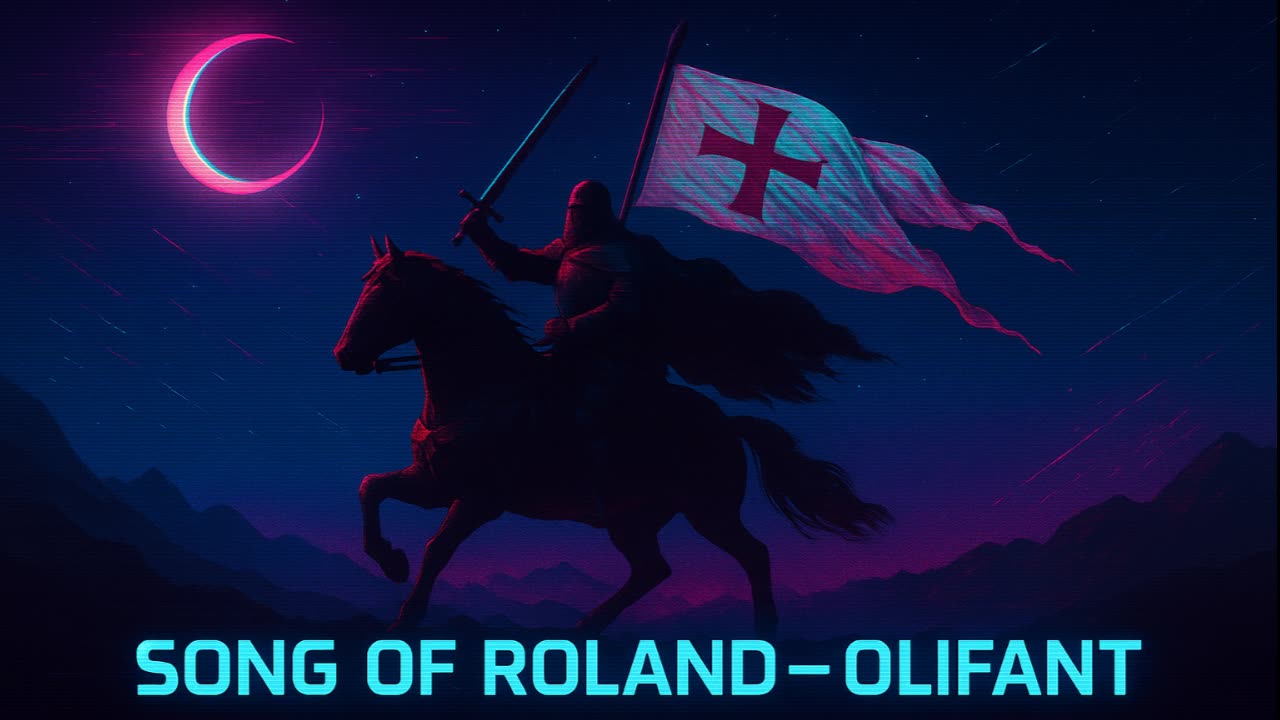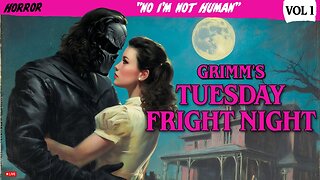Premium Only Content

SONG OF ROLAND // OLIFANT // OCCIDENTUM LUX
SONG OF ROLAND — OLIFANT
Occidentum Lux — The Light of the West. Our light comes from Christ. The battle between good and evil did not end in the Middle Ages; it rages in every age and every heart. This track is a retro-glitch darksynth/techno retelling of the medieval epic battle, with cinematic violin solos, war-horn stabs, and a blade-bright synth lead for Durendal.
Who Roland Was
Roland is the hero of The Song of Roland, a legendary Frankish knight and military commander, famed for courage and loyalty. He serves as a captain of Charlemagne’s rear guard and embodies fealty, honor, and costly heroism.
Charlemagne (Carolus Magnus)
Charlemagne — King of the Franks and later Emperor— unifies realms in Western Europe. Roland is Charlemagne’s knight and vassal, sworn to defend the realm.
In the late 700s, Charlemagne pushed Christian power onto European soil held by Muslim-ruled al-Andalus, sending Frankish armies across the Pyrenees to pressure cities like Zaragoza and cultivate client allies against the Emir of Córdoba. His goals were to project authority, secure tribute and alliances, and establish a defensive buffer—the Spanish March—that later solidified with the capture of Barcelona (801) under his son Louis the Pious. Roland, a Frankish field commander under Charlemagne, took part in the 778 intervention toward Zaragoza, serving as a senior officer helping to enforce submissions and safeguard the advance; he’s historically attested in this campaign as part of Charlemagne’s effort to confront and contain Muslim-ruled forces in the Iberian Peninsula.
The Battle at Roncevaux (Roncesvalles), 778
In the poem’s telling, Roland’s rear guard is ambushed in a narrow mountain pass. Oliver urges him to blow the olifant (war-horn) to summon Charlemagne back. Roland delays—pride and resolve—until it’s too late. When he finally sounds the horn, he blows so fiercely that his temples burst; help does come, but many have already fallen.
“Muslim invasion / Christian battle” in the Epic
The poem casts the enemy as Saracen forces led by Marsile (and later Baligant), opposing Charlemagne’s Christian host. That stark religious framing drives the epic’s drama and martyrs’ imagery—and fuels the track’s apocalyptic tone.
Durendal — Roland’s Sword
Roland’s blade Durendal (“the Enduring One”) is a holy sword. Medieval tradition says its hilt holds relics:
a tooth of Saint Peter
the blood of Saint Basil
a hair of Saint Denis
a fragment of the Virgin Mary’s robe
Unbreakable and radiant, Durendal symbolizes faith that outlasts death. In the track, Durendal’s motif is the searing, high synth lead that cuts through the mix.
What the Lyrics Mean (highlights)
“Raise the horn—split the night!” — Roland’s desperate olifant call; duty finally overcomes pride.
“Frankish steel meets the Saracen tide / Blades of the cross, crescents collide.” — The epic’s religious clash, staged like a tidal onslaught.
“Gold on a tongue… price on a crown.” — Ganelon’s betrayal that set the ambush in motion.
“Palm on the earth… face to the east.” — Roland’s death posture, oriented toward Jerusalem and eternity.
Occidentum Lux (Light of the West) is the banner for this piece: artistry inspired by the inheritance of the West, acknowledging that our light comes from Christ. The music is a reminder that valor, repentance, and hope are never outdated.
-
 2:49:26
2:49:26
Laura Loomer
5 hours agoEP145: Trump Makes BOMBSHELL Autism Announcement
35K18 -

SpartakusLIVE
6 hours agoEXPLOSIVE $400+ 2v2 Tuesday has viewers GLUED to the screen
46.1K1 -
 3:19:06
3:19:06
GrimmHollywood
5 hours ago🔴LIVE • GRIMM'S TUESDAY FRIGHT NIGHT • STARRING GRIMM HOLLYWOOD • NO, I'M NOT HUMAN PART 1 •
28.2K2 -
 1:21:01
1:21:01
Flyover Conservatives
12 hours agoAI Encouraged Suicide: The Global Experiment on Our Kids - Joe Allen | FOC Show
37.4K4 -
 1:07:40
1:07:40
Glenn Greenwald
7 hours agoTucker Carlson on Charlie Kirk Assassination Fallout, Free Speech, Foreign Policy, and the Reaction to his Kirk Remarks | SYSTEM UPDATE #520
175K128 -
 14:22
14:22
Robbi On The Record
2 days ago $1.69 earnedGen Z’s Narcissism Obsession: Why Everyone’s a “Psychologist”
37.3K14 -
 8:15:08
8:15:08
GritsGG
8 hours agoQuad Win Streaks!🫡 Most Wins in WORLD! 3600+
57K2 -
 1:09:28
1:09:28
Sarah Westall
5 hours agoCan the World Be This Strange? The Nature of Our Reality w/ Darius J Wright
38K3 -
 1:58:20
1:58:20
megimu32
5 hours agoOn The Subject: Friends | 31 Years of the Sitcom That Defined a Generation
36.5K5 -
 30:00
30:00
BEK TV
1 day agoCounter Culture Mom
10.8K